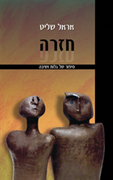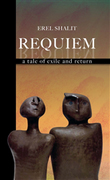Requiem: A Tale of Exile and Return
The razor-sharp edge of religious beliefs and national conflict, of shadowy projections and existential anxiety, that characterize Israel and its neighbors, gives rise to a particular blend of archetypal fate and personal destiny, of doubt and conviction, despair and commitment, of collective identity and personal choice.
However, I do believe that the essence of my wonderings reach beyond the shores of the eastern Mediterranean or Jewish tradition. I believe the tension between a sense of exile and return, belongingness and estrangement, are universal aspects, certainly in our post-modern world. While Israeli reality provides the external context, the story serves, as well, as a metaphor for the exile and return of the soul, which necessarily is a journey through shadowy valleys.
Requiem returns us to an eternal theme, a dialogue with Soul, and we know quite well what happens when one dialogues with Soul—we change, consciousness is enlarged, the impossible becomes possible and we no longer are compelled to blindly follow in the deathly path of our forefathers.
Requiem is a fictitious account of a scenario played out in the mind of many Israelis, pertaining to existential reflections and apocalyptic fears, but then, as well, the hope and commitment that arise from the abyss of trepidation. While set in Israel sometime in the present, it is a story that reaches into the timelessness of history, weaving discussions with Heine and Kafka into a tale of universal implications.
The Story of Requiem on YouTube
Requiem: A Tale of Exile and Return
A review by Marcela London
Erel Shalit’s Requiem: A Tale of Exile and Return touched me deeply, deep into the waters of my soul. From that ocean, I will choose to mention a few of the many emerging waves.
The book traces historical events, in which the longing for home can be felt: a real home, a collective home, and the personal and internal home that the author aims at, by means of the narrator of the book, Eliezer Shimeoni.
This is his private odyssey, but in distinction from Ulysses, he chooses not to relate to the siren’s song as merely a danger, but rather as a call to make the journey towards the soul’s home.
Erel Shalit’s narrative has a unique, fascinating and powerful style, which touches you strongly. Particularly, he has a way of leading the reader to grasp complicated historical processes with unusual ease.
Interwoven in a narrative of fiction and seeming non-fiction, we meet familiar figures from philosophy and literature, such as Kafka, who asked his friend Max Brod to burn his books after his death, a wish which, to the great fortune of humankind, the latter did not fulfill. In Requiem the author brings us both to Heine and the burning of books, and back to the fate of Hananiah ben Terdion in the second century.
The story of the second-hand bookshop reminded me of Borges’s famous library; Shimeoni also found refuge in the many old books: “The old bookshop granted an escape into a world of history books and timeworn atlases in which he could sail across the sea of time and continents, where fear and excitement and heroism were free and asked no price. It was a world of books that he could browse but never buy, an odyssey that could only be traveled, but never owned.”
I was carried away by the ruminations of the protagonist who wonders if he was “a mere actor in the play? What he believed to be his own, free and individual will, his personal determination, his choice and his decisions, his own peculiar thoughts, were they nothing but the manifestation of his allocated role, the text he had been given, none of his own creation?” And, “Without soul, there is no water and no liquid, no stream, no steam, and perhaps also no dream, he told himself, almost speaking out loudly. Soul does not have material substance,” says Shimeoni in the book, in his Zen-like reflections. And he is reminded of the film Smoke, based on a script by Paul Auster. The film tells the story of Sir Walter Raleigh who asked Queen Elizabeth in the 16th century, “How do you weigh smoke?” Clever as she was, she supposedly answered him, “How can you weigh smoke? It’s like weighing air or someone’s soul,” we are told. But the narrator contemplates and eventually provides us with the surprising answer.
In Requiem we are presented with two distinct styles of writing, so that we are almost led to believe that two different authors wrote the book. We find not only the narrator of a story, but also the spiritual and lyrical face of the author.
I highly recommend this fascinating and important book, which presents the reader with the simultaneously intellectual and emotional landscapes of Erel Shalit.
Marcela London, poet, author of The Beginning Was Longing (Hebrew, 2013)
Links to blog posts:
The Story of Requiem on YouTube
Requiem: A Tale of Exile and Return
Requiem: A Tale of Exile and Return
The Rope on the Eve of Atonement
An excerpt from Requiem: A Tale of Exile and Return
Requiem: A tale of exile and return is available in English and in Hebrew
at Amazon, Fisher King Press, Barnes and Noble, and other book sellers.


























